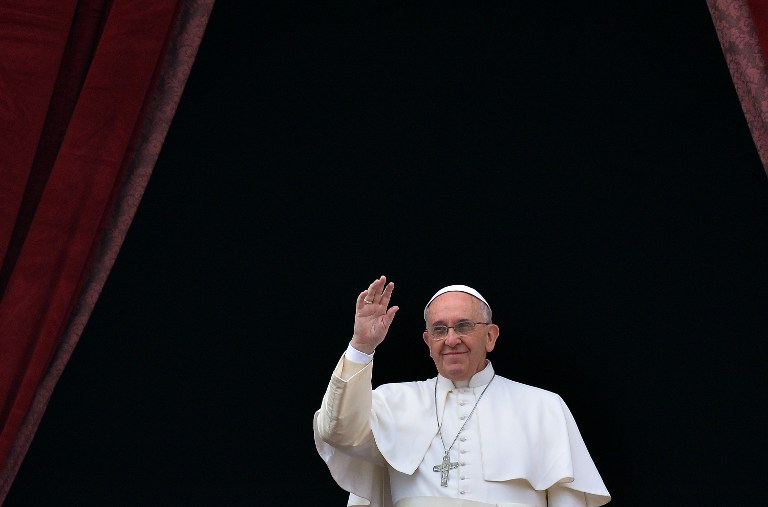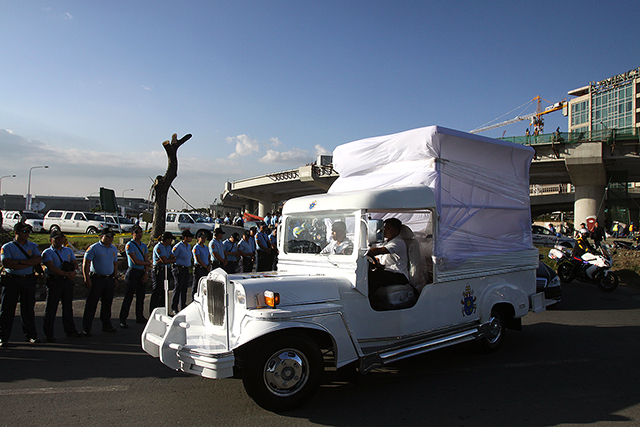ADVERTISEMENT
Filtered By: Topstories
News
EDITORIAL: What Pope Francis' visit means to the Philippines

Pope Francis delivers his 2014 Christmas message. Reuters
When Pope Francis visits Eastern Visayas later this week, he will do much more than commiserate with victims of Yolanda, the super typhoon that devastated the region in 2013. The pontiff's trip to Tacloban City and Palo, Leyte has major implications in the global sphere, as he draws a direct line between high-level discussions about climate change and the people who have been and remain most at risk of extreme weather events.
Last year, the Pope characterized concerns about the environment as "one of the greatest challenges of our time."
In an address at the University of Molise in Italy, the Pope framed the issue as a moral one: "This is our sin, exploiting the Earth and not allowing her to give us what she has within her."
His statement came shortly after the Vatican hosted a five-day summit to discuss ways the Catholic Church can address issues related to climate change. In a statement after the close of the conference, participants noted how issues of the environment affected the world's poorest: "Human action which is not respectful of nature becomes a boomerang for human beings that creates inequality and extends what Pope Francis has termed 'the globalization of indifference' and the 'economy of exclusion.'"
They added: "The warming and associated extreme weather will reach unprecedented levels in our children's life times and 40 percent of the world's poor, who have a minimal role in generating global pollution, are likely to suffer the most."
Pope Francis will take a step further in the issue this year; in March, shortly after his visit to the Philippines, he is expected to publish the first-ever encyclical on climate change and human ecology, that would encourage the faithful to take action on the issue. While his predecessors, John Paul II and Benedict XVI, have both addressed matters pertaining to the environment in the past, it is expected to be the first time the leader of the Church will have a rare encyclical devoted solely to this matter.
All these moves, according to Bishop Marcelo Sorondo, chancellor of the Vatican's Pontifical Academy of Sciences, will lead into the United Nations climate meeting in Paris in November, where countries will put the final touches to an accord that will hopefully have a universal commitment to reduce emissions.
And when Pope Francis comes to Eastern Visayas, he will be showing the rest of the world the faces behind why he is taking these actions. He will be shedding light by communing with a people who have already suffered so much, who remain in constant fear for their safety, and who remain are still waiting on a promise of permanent homes that would not require them to evacuate every time a storm is coming.
When Pope Francis makes his argument against climate change, he is showing that he isn't merely a theologian making a biblical case for protecting the environment; he is a shepherd taking care of what his flock — in Tacloban, in Palo, and in most of the rest of the world — most needs.
This is important because, as Fr. Thomas J. Reese, SJ of the National Catholic Reporter puts it, the Catholic Church is a "church of symbols."
"That's what we call the sacrament: symbols that give us grace. These things really matter. So Francis is already changing the Church in real ways through his words and symbolic gestures," said Reese in his analysis of the papacy in 2013.
To the cynical, it's easy to dismiss Pope Francis' visit to Leyte as mere show. After all, he would only be able to see so many people, and Lord knows the problems plaguing Yolanda survivors would remain long after Pope Francis has gone.
It would be so easy to be cynical, and be so wrong. The gesture comes with a message, from the shepherd to his flock, that is as simple as it is powerful: Do not be afraid, for I am with you.

One of three popemobiles to be used for Pope Francis' visit. Danny Pata
The actions of Pope Francis toward the issue of climate change — indeed, combining the issue of economic justice with environmental justice — is only the latest evidence that he is the leader the Catholic Church needs in these modern times.
Soon after taking over the papacy, Pope Francis has pushed the Catholic Church toward what people are calling "a gentle revolution," a move toward a Church that is more in touch with its faithful.
It started with a lengthy interview, a few months into his papacy, when he said that the Church had been "obsessed" with talking about abortion, gay marriage and contraception.
"It is not necessary to talk about these issues all the time. The dogmatic and moral teachings of the Church are not all equivalent. The Church's pastoral ministry cannot be obsessed with the transmission of a disjointed multitude of doctrines to be imposed insistently," he said.
For the Filipino faithful, the pronouncement came as a breath of fresh air months after bruising debates on the Reproductive Health Law that, unfortunately, painted the country's Catholic hierarchy as angry, if out of touch — more concerned with drawing battle lines that divide instead of circles that would unite.
With his actions, Pope Francis has worked toward bringing the dictionary definition of catholic — "universal," "broad-based," "eclectic" — back to the Catholic Church. Once known for its tough stance on social issues, the Church is once again coming to be defined for compassion and love, especially for the poor.
And indeed, the local Catholic hierarchy is beginning to follow suit. Notice the circular sent by Catholic Bishops' Conference of the Philippines president Lingayen-Dagupan Archbishop Socrates Villegas to members of the clergy to ring in the New Year, lashing out at how the "sickness of accumulating possessed us so quickly."
"When we become too reactive and possessive and materialistic, we become less effective and less credible as pastors. The loss of humility and the sickness of accumulation in Church ministry can be very costly. With materialistic clericalism laid aside, and Gospel empowered humble shepherding taking its place, we might be able to see the rainbow of hope in the Year of the Poor," said Villegas in the circular.
It's tempting to paint Pope Francis as a maverick, a single revolutionary voice fighting to reform a staid institution.
But as romantic as the notion may seem, it isn't exactly true; the Catholic Church is not a monolith.
Its people are as diverse and as different as the majestic palaces inside the Vatican and the pop-up chapels inside malls that host Sunday masses in the Philippines.
Thankfully for us, that means that Pope Francis is not alone. He is far from being alone.
One does not have to look far for examples. Even amid our disagreements with the Church, there remain among us, everyday, men and women of faith who quite literally do the Lord's work in the trenches — organizing our urban and rural poor (and being harassed for their troubles), educating our youth, taking care of our abandoned children, healing our sick, and making sure that our faith remains strong.
That this faith has remained strong through centuries is a testament to how it has brought comfort and hope to our people through trials and tragedy, distance and separation — in no small part thanks to men and women of the cloth who, in Pope Francis' words, are "shepherds living with the smell of the sheep."
The papal visit will shine a light on this face of the Church, which remains an integral part of our society precisely for being the embodiment of what Pope Francis is pushing for — an unending well of compassion and love, especially for the poor.
Millions of people will welcome Pope Francis when he comes to the Philippines. For many, it will be an affirmation of faith. But it also comes with a cry, from the flock to shepherd, for Pope Francis to continue what he is doing, for our good and the good of all His Church.
Tags: popefrancis, papalvisit2015
More Videos
Most Popular




